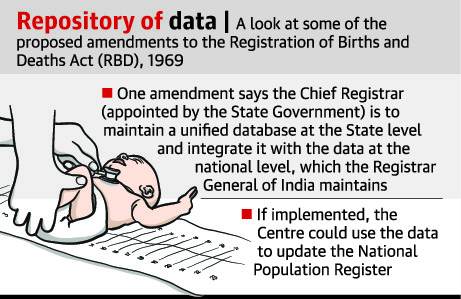Indian Society
Registration of Births and Deaths Act (RBD), 1969
- 29 Oct 2021
- 2 min read
Why in News
Recently, the Centre has proposed amendments to the Registration of Births and Deaths Act (RBD), 1969.
- It will enable it to “maintain the database of registered birth and deaths at the national level”.
Key Points
- Registration of Birth and Death:
- Registration of Births and Deaths in India is mandatory with the enactment of Registration of Births and Deaths (RBD), Act 1969 and is done as per the place of occurrence of the event.
- With a view to simplify the provisions of various sections of the existing RBD Act, 1969 and to make it people friendly, the amendment has been proposed.
- Proposed Amendments:
- Chief Registrar to maintain Unified Data:
- The Chief Registrar (appointed by the States) would maintain a unified database at the State level and integrate it with the data at the “national level,” maintained by the Registrar General of India (RGI) (under the Ministry of Home Affairs) .
- Presently, the registration of births and deaths is done by the local registrar appointed by States.
- The Chief Registrar (appointed by the States) would maintain a unified database at the State level and integrate it with the data at the “national level,” maintained by the Registrar General of India (RGI) (under the Ministry of Home Affairs) .
- Special Sub-Registrars:
- The appointment of “Special Sub-Registrars, in the event of disaster, with any or all of his powers and duties for on the spot registration of deaths and issuance of extract thereof, as may be prescribed.”
- Chief Registrar to maintain Unified Data:
- Expected Use of the Data:
- To update the National Population Register (Citizenship Act, 1955) and the electoral register (Registration of Electors Rules, 1960), and Aadhaar (Aadhaar Act, 2016), ration card (National Food Security Act, 2013), passport (Passport Act) and driving licence databases (Motor Vehicles (Amendment) Act, 2019).
- The NPR already has a database of 119 crore residents and under the Citizenship Rules, 2003, it is the first step towards the creation of the National Register of Citizens (NRC).
- The NPR update and the first phase of Census will be conducted simultaneously by the RGI.
- To update the National Population Register (Citizenship Act, 1955) and the electoral register (Registration of Electors Rules, 1960), and Aadhaar (Aadhaar Act, 2016), ration card (National Food Security Act, 2013), passport (Passport Act) and driving licence databases (Motor Vehicles (Amendment) Act, 2019).





